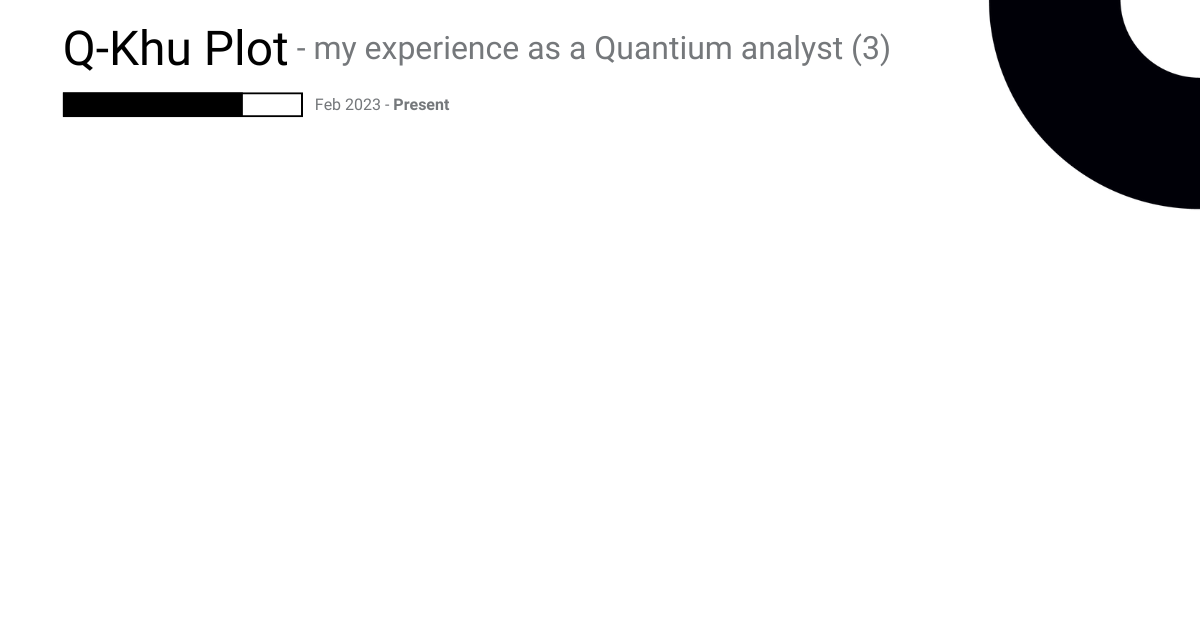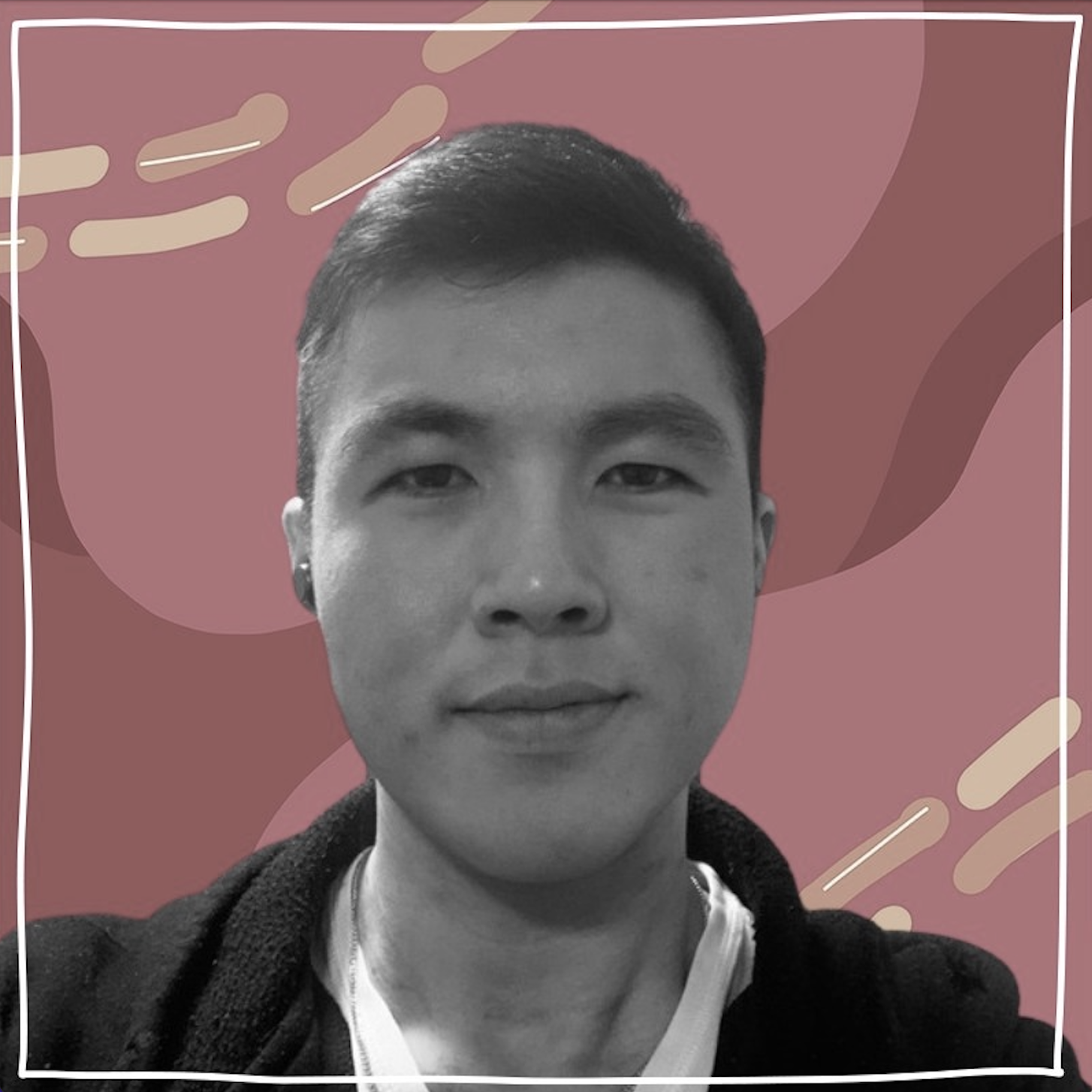Q-Khu Plot – my experience as a Quantium data analyst (3)
Posted on: June 8, 2024
Post Category: Professional Development

One-and-a-half years into my Quantium experience – and my data analytics career!
Here’s what my experience has been so far (over the past 6-or-so months)…
For those who aren’t familiar with the ‘Q-Khu Plot’ series, it is a series commenting on my experience at Quantium.
I’ve written part 1 around this time last year, and I’ve written part 2 at the beginning of this year (where I was nearly finished the graduate program).
Now, the experience I had over the past 6-or-so months has been… an interesting one, to say the least.
At the start of the year, I was allocated to Quantium Health. But because of changing resourcing needs, I moved around quite a lot.
For the first week, I worked on a slide deck for an overseas healthcare client.
The week after, I worked on a slide deck for a healthcare client based in Australia (and did that for two weeks).
The week after, I worked on building/coding the front-end for one of the business’s AI use cases (and did that for a month).
After that, I worked on a few slide decks for a prospective client in a pretty unfamiliar/untapped industry (and did that for 3-4 weeks).
I went on vacation for 2 weeks… then came back working on a slide deck for the Quantium Health CEO, about GenAI.
But anyway, yeah… it has been an experience. And I’ll share, in greater detail, about the following things:
- My reaction to (first) joining Quantium Health, and my thoughts on it now
- My more-informed perspective on consulting work
- Things I’ve learnt broadly, about (Health) consulting and for my career
1. My reaction to (first) joining Quantium Health, and my thoughts on it now
So during late 2023 (or early 2024 – I don’t exactly remember when…), I was close to finishing the graduate program, and everyone in my cohort was asked to select what part of the business they would like to go to.
Long story short, I didn’t pick Health (I actually wanted to avoid it). But I got it anyway.
I didn’t pick it because I value(d) having the extra time (from more-flexible working) to focus on other important things like my health, personal projects, family, etc.
And eventually, I would sometimes work late hours and work in a high-pressure environment.
There was one *small* project, which I worked on for 2 weeks, which required putting a powerpoint presentation together. And during those weeks I worked as early as 7:30am, to meet with someone based in the US. And I worked as late as 7:30pm-9pm to contact someone in the UK, and to finish off work before a deadline.
Yeah, this was what I wanted to avoid.
But did I hate the experience? I mean, no. I’d be lying if I said the work didn’t get frustrating… but I found it to be a fruitful learning experience (more on this later).
And who knows, the experience will most likely benefit me later down my career (even when I don’t see it now).
2. My more-informed perspective on consulting work
I did have a changing perspective to consulting, because of my time in Quantium Health.
And my perspective is this:
When you’re in the first couple of years (at least) of your consulting career, you’re probably putting some slides or a slide deck together for your manager… and that’s kind of the extent of your contribution, if you’re not actually talking to clients or doing any technical work.
It doesn’t *sound* like much work, but from my experience, that’s what it felt like and I found it quite challenging.
(I would like to emphasise that is *from my experience*)
When I was at Uni, there was all this hype about being a management consultant – that it’s a good way to:
- learn a good breadth of skills,
- learn about a wide range of clients/industries,
- work with people who are very switched-on, and
- engage with very high-profile people who have clear business problems.
And it *is* a good learning experience – because you learn things very quickly.
But on the flip side, which I’ve experienced first-hand, the pace tends to be fast:
- You have to make decisions and respond to feedback very quickly – to deliver outcomes on time, for your manager or your client.
- You have to be able to navigate uncertainty – to put together presentation slides, even when you know very little about the context or when you’re not acquainted with the stakeholder as well as your manager.
- You tend to feel like an imposter (at least in your early months/years), when you’re working with unfamiliar clients/industries.
- And you kinda have to be tough – because sometimes requests and direct feedback can be a challenge to handle.
Ultimately, it’s a high pressure environment. But you learn heaps.
For me, it was indeed a fruitful learning experience:
- I learnt about the problems/considerations some healthcare clients had – from an executive point of view
- And I got a broader perspective of Quantium’s business and it’s capabilities (especially regarding our work with GenAI) – which was super insightful
But… the work is not really something I want to do long-term.
Because I would like to keep building my technical competencies, and I still value having extra time (from… not working) to invest in other areas of my life.
3. Things I’ve learnt broadly, about (Health) consulting and for my career
Tough experiences have their purpose – while it may not be obvious.
You became the person you are today because of the experiences you had prior – the great and not-so-great. And a tough experience today, where you are learning a lot, can have great returns somewhere down the line.
How does this learning tie into my experience?
Knowing how to navigate uncertainty, knowing about healthcare companies (and companies in other industries) and some of the processes they need to work through… might not be a particularly useful thing for me now. But it could be when I progress later in my career – perhaps when applying for a new role, or when a new project at my company pops up, or if I move on to be an independent consultant.
Usually, I’d complain to my peers (jokingly) about me moving between teams so much – and not having the proper time to settle with team members and learn things deeply (which is… true).
But given the advice I received along the way, I kinda look back at the experience and appreciate the good breadth of knowledge I’ve gained and could bring to another opportunity further down the line.
Dealing with uncertainty is part of a consultant’s job and it doesn’t really get that much easier – but there are frameworks out there to stay organised.
For slide decks in particular, a few other data analysts and myself got the opportunity to learn from a coach who had experience at McKinsey, on health-related consulting work.
She shared with us a framework on how to build a deck from the ground up and present it well – which was condensed to the 8 S’s. But the main highlights I took away from the session was definitely: (1) figuring what SMART question you are hoping to answer for the client, (2) having a hypothetical story you would like to share, (3) ensuring the ‘why’ and the ‘so what?’ of each slide, and (4) consulting is a team-sport where you’ll get a lot of feedback/ideas.
I’ve done four different consulting-based projects over the three months since finishing the graduate program, and the struggle of navigating this uncertainty (at the beginning of each project) was always there. And for the most part, I felt like I was winging it.
But putting some frameworks in place made it a bit more manageable.
And on reflection, perhaps I could have built some accountability for myself – by proposing, figuring out and committing to what ‘good’ looks like with more-senior analysts/consultants in the team.
The process of securing Health/Government projects is also an interesting one… so I’ve learnt.
So for some healthcare and government-related consulting work, you have a board of firms that require some assistance – and they propose a problem.
On that board, you also have a lot of different consultancies that pitch themselves to the clients hoping to win the work and take it on as projects.
This is done through a “tendering” process – which starts off by inviting consultancies to make proposals, and ends with the awarding of projects.
But this tendering process is regulated. Basically, this means you can’t charge the clients ridiculous prices – it has to be fair and must align with the cost/charge rates (set by the consultancy) of the employees involved.
And for clarity, a cost/charge rate is the rate at which a client is charged for a consultant’s time working on the project – and this is usually benchmarked by industry standards.
For example, an executive-level consultant might have a charge rate of $200/h, while a associate-level consultant (who’s lower in the organisation) might have a charge rate of $100/h.
But overall, company culture’s still pretty good, and work has been interesting.
And over the past two-or-so months of sharing this post, I’ve been moved to yet another team… but this time, it’s a more internal-facing one, where I’m working with software engineers on the development of a new product for the company.
And that… presents a different kind of challenge which I am currently navigating through.
But the story and learnings of that experience will come another time.
I shall share my fourth iteration of Q-Khu plot around my two-year anniversary – and it will definitely talk about that.
______
My name is Jason Khu, and I write about data analytics/visualisation and professional development for young professionals.
You can read more of this type of content by checking out my personal blog Data & Development Deep Dives and by following or connecting with me on LinkedIn.

About the author
Jason Khu is the creator of Data & Development Deep Dives and currently a Data Analyst at Quantium.